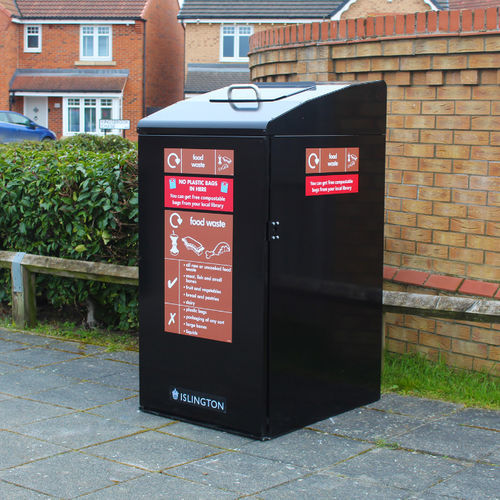
Airport waste bin FWWB/WEBfloor-mountedrecycling
Add to favorites
Compare this product
fo_shop_gate_exact_title
Characteristics
- Applications
- for airport
- Installation
- floor-mounted
- Other characteristics
- recycling
- Capacity
Max.: 240 l
(63.4 gal)Min.: 0 l
(0 gal)
Description
The Food Waste Wheelie Bin Cover has been specifically designed for the hygienic collection of food waste and is ideal for communal use.
Disposing of your food waste couldn’t be easier; simply lift the flap using the stainless steel anti-microbial handle and deposit the rubbish into the awaiting wheelie bin. A gas strut is fitted to the lid to ensure a soft closing motion that gives the user enough time to put their food waste safely in the bin as the lid closes gradually.
Did you know that an estimated 7.3 million tonnes of food waste ends up in landfill each year and food waste in the UK has increased 4.4 per cent since 2012. The average family wastes £470 a year by throwing away food and drink, and a further £3 billion is wasted by food sectors.
Food waste that is not recycled ends up in landfill, which produces a harmful amount of greenhouse gases that contribute towards global warming and climate change.
That’s why most councils now collect food waste, which is recycled in two different ways. In-vessel composting involves mixing food waste with garden waste and composting it in an enclosed system for up to a month, where it is heated to kill bacteria and then matured for 1-3 months ready to be used as soil.
Another method is anaerobic digestion; this uses microorganisms to break down food waste to give off methane, which is collected and converted into bio-gas and used to generate electricity, heat or transport fuels.
Catalogs
No catalogs are available for this product.
See all of Wybone Limited‘s catalogsRelated Searches
*Prices are pre-tax. They exclude delivery charges and customs duties and do not include additional charges for installation or activation options. Prices are indicative only and may vary by country, with changes to the cost of raw materials and exchange rates.

